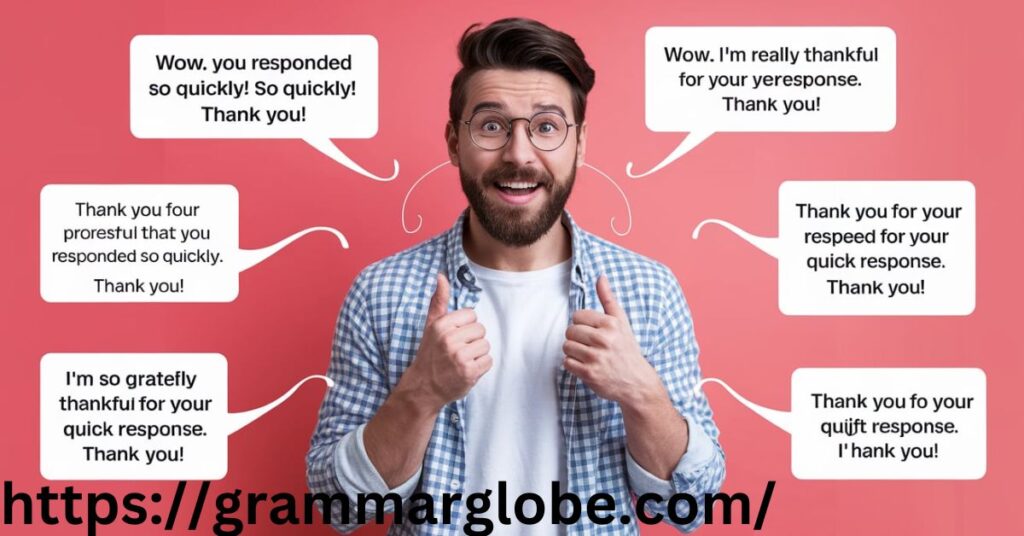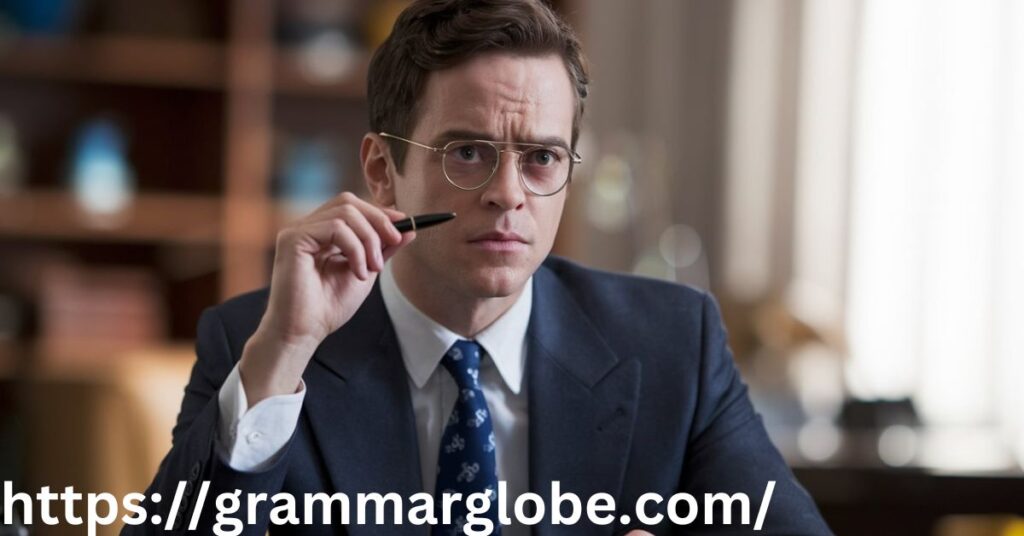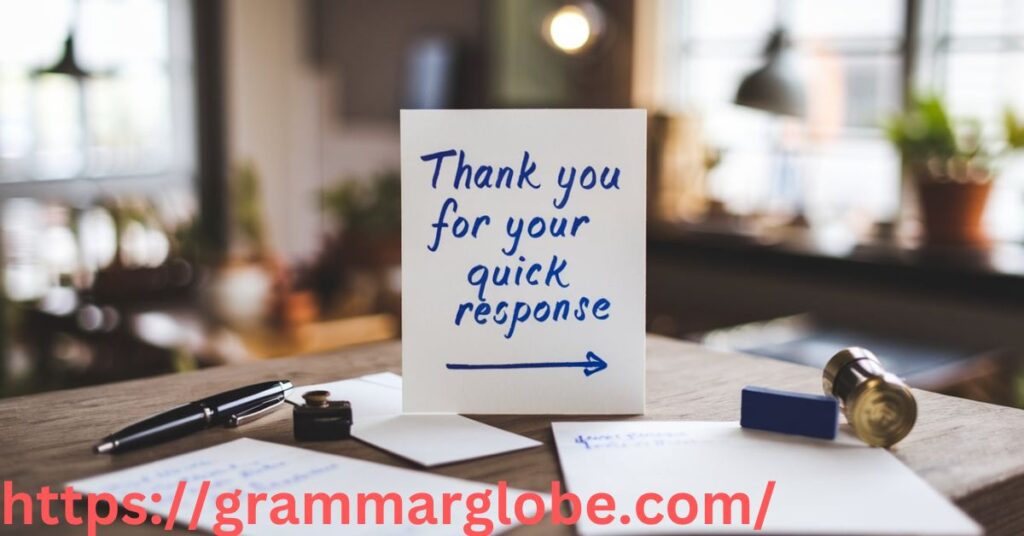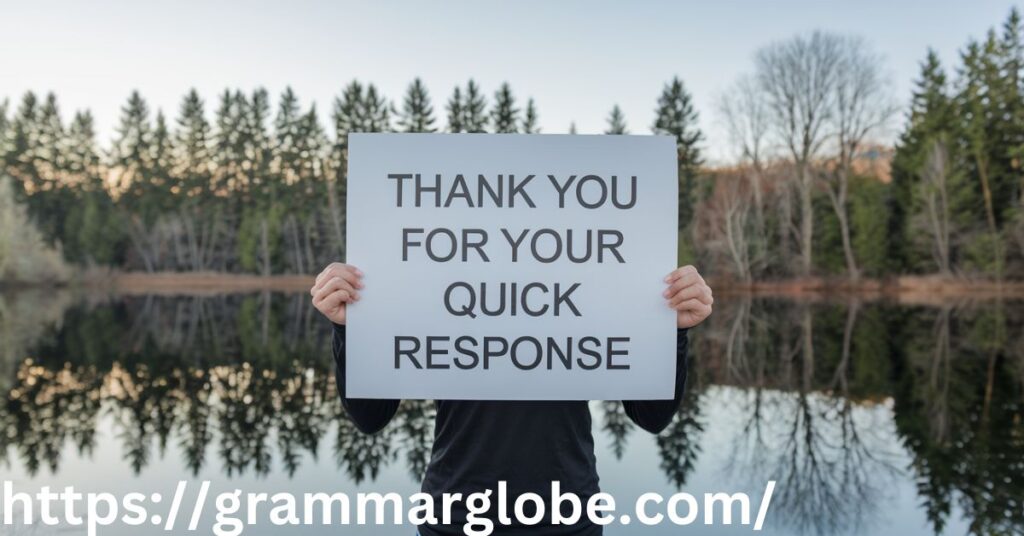In today’s fast-paced world, timely communication has become a cornerstone of both professional and personal interactions. Whether you’re working with colleagues, clients, or friends, acknowledging a swift response can go a long way in strengthening relationships and fostering efficient communication. One simple, yet impactful phrase that captures this gratitude is: “Thank you for your quick response.”
Saying “thank you for your quick response” not only conveys appreciation for someone’s timely reply but also emphasizes the importance of their effort. In professional settings, a prompt reply can signal efficiency, respect, and dedication to the task at hand. By expressing gratitude for such responsiveness, you encourage continued engagement and collaboration, which ultimately leads to smoother, more productive interactions.
Gratitude, especially in the form of recognizing a swift reply, can significantly enhance communication dynamics. It encourages the recipient to continue replying promptly, creating a positive feedback loop. Moreover, it helps establish a professional tone, making future exchanges more constructive and cooperative.
In this article, we’ll explore why saying “thank you for your quick response” matters, how to incorporate it into your daily communication, and the impact it can have on both professional and personal relationships. Let’s dive into the power of gratitude in communication.
Why Saying “Thank You for Your Quick Response” Matters

Professionalism and Respect
In both business and personal communication, acknowledging someone’s effort by saying “Thank you for your quick response” demonstrates respect. It shows that you value the other person’s time and are aware of the effort they put into responding to your inquiry or request. Whether it’s a colleague, client, or business partner, recognizing quick replies helps maintain a professional tone and reinforces mutual respect.
As the business world becomes more fast-paced, efficient communication has never been more critical. Expressing gratitude in this way highlights professionalism and encourages timely exchanges in the future. Acknowledging swift replies can set a positive tone for the entire conversation, which can improve future interactions.
“The art of communication is the language of leadership.” – James Humes, Author
Building Strong Relationships
Gratitude is a cornerstone of building and nurturing relationships. By thanking someone for their prompt reply, you show them that their time and effort matter to you. In professional settings, positive connections are key to long-lasting partnerships. When colleagues or clients know that you appreciate their swift response, they are more likely to engage with you in a timely manner in the future.
Similarly, expressing thanks for quick responses fosters a collaborative spirit. In team projects, a simple acknowledgment can motivate others to continue contributing efficiently and collaboratively. Gratitude serves as a subtle form of encouragement, fostering a productive and friendly work environment.
Enhancing Communication Efficiency
In professional environments, time-sensitive tasks require quick decision-making and response. By thanking someone for their quick response, you create an atmosphere that values efficient communication. This can lead to faster decision-making processes, reducing unnecessary delays and promoting timely responses in the future. Expressing appreciation for someone’s prompt reply sets a precedent for effective, swift communication, encouraging the habit of rapid engagement.
Situations When You Should Use “Thank You for Your Quick Response”

Email Correspondence
In today’s digital age, email remains a primary means of communication in both business and casual settings. When you receive a swift reply to an important query, acknowledging that effort with a simple thank-you message can have a lasting positive impact. A professional tone in email communication can set the stage for a productive conversation and make the recipient feel valued.
For example, if you’ve asked a colleague for assistance with a task, and they respond quickly, you can reply with:
“Thank you for your quick response! Your input is invaluable in helping me meet this deadline.”
This message not only acknowledges their quick turnaround but also emphasizes your appreciation for their time-sensitive reply, strengthening your collaborative interactions.
Business Transactions
In business, quick responses are crucial for maintaining momentum in transactions. If you’re finalizing a deal or negotiating terms, timely replies can keep things moving smoothly. By thanking a business partner or client for their rapid engagement, you show professionalism and appreciation for their immediate response, which can contribute to a positive engagement.
Imagine you’re negotiating a contract, and your client quickly responds to your proposal. A message like:
“Thank you for your quick response and your thoughtful insights. I appreciate your prompt attention to this matter.”
This helps maintain the flow of the negotiation and reinforces the importance of mutual respect in business dealings.
Customer Support and Service
In customer service, acknowledging speedy feedback is not just polite; it’s essential for maintaining customer satisfaction. Whether it’s a support team responding to a service issue or a vendor delivering a product update, expressing gratitude for swift replies shows that you value the assistance provided. For businesses, this simple gesture can significantly boost customer loyalty and promote positive word-of-mouth.
When thanking a customer service agent for their prompt response, you can say:
“Thank you for your quick response. I’m glad we were able to resolve this issue promptly!”
Such messages ensure that customers feel heard and appreciated, encouraging them to continue doing business with you.
Collaborative Projects
In team-based environments, timely responses are key to moving projects forward. Acknowledging a colleague’s rapid reply or quick action reinforces their effort and motivates them to continue contributing to the project. Whether you’re collaborating on a report, presentation, or brainstorming session, expressing thanks can foster a culture of teamwork and cooperation.
For instance, after a colleague quickly provides necessary data for a report, you could send:
“Thank you for your quick response. This data will help us meet our project deadline and ensure we’re on track.”
This reinforces the importance of everyone’s contributions and fosters a sense of shared purpose.
Alternative Phrases to Express Gratitude for a Quick Response

While “Thank you for your quick response” is effective, there are plenty of alternatives to express gratitude in a more personalized or varied way. Here are a few examples:
| Standard Phrase | Alternative Expression |
|---|---|
| Thank you for your quick response. | I appreciate your swift reply. |
| Thanks for getting back to me so quickly. | Your prompt reply is much appreciated. |
| I appreciate your rapid response. | Thank you for your timely feedback. |
| Thanks for your speedy reply. | I’m grateful for your fast response. |
| Your quick response means a lot. | Thanks for your immediate attention. |
Each of these variations adds a personal touch to your message and keeps the conversation fresh and engaging. Changing up your language ensures that your expressions of thanks don’t become monotonous, while still conveying your appreciation for the other person’s effort.
The Psychology of Gratitude in Communication

Why Gratitude is Important
Gratitude has been shown to have a powerful psychological impact on both the giver and the receiver. When you express thanks for a swift response, you strengthen your connection with the other person, creating a sense of emotional resonance. As research suggests, expressing appreciation triggers positive emotions and can foster feelings of warmth and trust.
For instance, a study from the University of California found that people who are thanked for their efforts are more likely to offer help again in the future. This creates a cycle of positive reinforcement, making future communication even more efficient.
“Gratitude is not only the greatest of virtues, but the parent of all the others.” – Marcus Tullius Cicero, Roman Philosopher
Cultural Significance of Gratitude
Different cultures have varying ways of expressing gratitude. While some cultures emphasize formal expressions of thanks, others prefer a more casual approach. Regardless of cultural context, however, expressing thanks for someone’s quick response is universally recognized as a polite and positive gesture that enhances relationships. Understanding the role of gratitude in communication across different cultures can make you a more effective communicator, particularly in global business interactions.
Impact on Future Communication
Gratitude is not only about the present moment; it can significantly affect future communication. By thanking someone for their prompt reply, you establish a pattern of polite, respectful communication that can encourage the same behavior from others in the future. When you consistently acknowledge quick responses, people are more likely to prioritize your messages and respond faster.
How to Properly Respond After Saying “Thank You for Your Quick Response”

Once you’ve thanked someone for their swift response, it’s important to keep the conversation moving. Here’s how to respond effectively:
| Action | Response Example |
|---|---|
| Keep the conversation going | “Thanks for your quick response! Here are the next steps…” |
| Be clear and concise | “Thank you! I’ll get back to you with more details soon.” |
| Show willingness for future replies | “I appreciate your quick response, looking forward to your thoughts on the next phase.” |
- Keep the conversation going: If the person has provided you with helpful information, continue the discussion. Ask for clarification if needed or share your next steps.
- Be clear and concise: After acknowledging their quick reply, get to the point of your message. This will help maintain efficiency and prevent unnecessary delays.
- Reciprocity in communication: Demonstrate your willingness to provide a timely response in return. This encourages a healthy exchange of information, which benefits both parties.
Best Practices for Sending a “Thank You for Your Quick Response”

Timing is Key
While it’s essential to express thanks for a swift response, it’s just as important to do so in a timely manner. A thank-you message sent too late can diminish its impact, as it may appear less sincere. Ideally, reply within a few minutes or hours of receiving the message, especially if it’s time-sensitive.
Maintain a Professional Tone
Regardless of how informal your relationship with the recipient may be, it’s crucial to maintain a polished communication style. Using proper grammar, punctuation, and a courteous tone will ensure your gratitude is received well. A professional tone can also reinforce your position as a thoughtful and considerate communicator.
Conclusion
In conclusion, expressing gratitude with a simple phrase like “thank you for your quick response” can significantly enhance the quality of your communication. In both professional and personal contexts, acknowledging someone’s timely reply is not just a courtesy but also an effective way to promote positive interactions and build strong relationships. By taking the time to recognize someone’s swift reply, you show respect for their time and effort, which encourages continued engagement and efficient communication.
The act of saying “thank you for your quick response” also helps establish a professional tone and reinforces the importance of clear, timely exchanges. This appreciation can foster a sense of mutual respect, motivating others to maintain the same level of responsiveness in future communications. Whether you are replying to an email, a message, or a phone call, taking a moment to express gratitude can have a lasting impact.
Ultimately, integrating expressions of gratitude like “thank you for your quick response” into your communication habits enhances relationship-building and collaboration, creating a more productive and pleasant environment. By mastering the art of appreciation, you not only improve your own communication skills but also encourage a culture of respect and efficiency that benefits everyone involved.
FAQs
What does “thank you for your quick response” mean?
It’s a polite way to express gratitude for a fast reply.
When should I use this phrase?
Use it after receiving a timely and helpful response.
Can I use it in a professional email?
Yes, it’s a courteous phrase to use in professional settings.
Is it appropriate for casual conversations?
It works well in both formal and informal conversations.
Why is it important to say “thank you for your quick response”?
It shows appreciation for the other person’s effort and time.
What are some alternatives to this phrase?
You can say, “I appreciate your fast reply” or “Thanks for your quick reply.”
Do I need to say it every time I get a quick response?
Not always, but it’s helpful in important or time-sensitive situations.
How can I make my thanks sound less repetitive?
Change it up with phrases like “Thanks for your prompt reply” or “I’m grateful for your speedy response.”
Does saying this improve communication?
Yes, it encourages efficient communication and shows respect.
What if the response wasn’t quick?
Say, “Thank you for your reply” without mentioning speed.

Irha Queen, a talented writer at grammarglobe.com, specializes in crafting witty puns and exploring the intricacies of English grammar. Her playful yet informative style makes language learning fun, blending humor with clear explanations to engage readers of all levels. Whether she’s spinning clever wordplay or breaking down complex grammar rules, Irha’s content is both entertaining and educational, making her a favorite among language enthusiasts.







